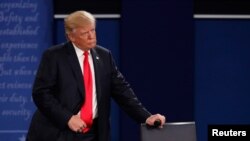U.S. President Donald Trump on Monday said he looks forward to debating his eventual Democratic opponent when he runs for re-election next year, but bashed the independent commission that for decades has arranged the logistics of the debates as politically aligned against him.
"The problem is that the so-called Commission on Presidential Debates is stacked with Trump Haters & Never Trumpers," the Republican president said on Twitter. "3 years ago they were forced to publicly apologize for modulating my microphone in the first debate" against the Democratic nominee, former Secretary of State Hillary Clinton.
"As President, the debates are up to me," Trump tweeted, "and there are many options, including doing them directly & avoiding the nasty politics of this very biased Commission. I will make a decision at an appropriate time but in the meantime, the Commission on Presidential Debates is NOT authorized to speak for me (or R's)!"
Still, Trump said he looks "very much forward to debating whoever the lucky person is who stumbles across the finish line in the little watched Do Nothing Democrat Debates. My record is so good on the Economy and all else, including debating, that perhaps I would consider more than 3 debates."
The commission, created in 1987 by the Republican and Democratic parties to oversee the quadrennial presidential and vice presidential debates, is overseen by prominent Democrats and Republicans and other public figures. Its current three co-chairs are Frank Fahrenkopf, a former Republican national chairman; Dorothy Ridings, chief executive of the Council of Federations of charitable groups, and Kenneth Wollack, a former president of the National Democratic Institute, a non-governmental organization that promotes democracy worldwide.
The commission has already announced plans for three presidential debates and one vice presidential debate next September and October in the weeks ahead of the Nov. 3 national election, with all of them on U.S. university campuses.
The commission acknowledged that in the first 2016 Trump-Clinton debate, "there were issues regarding Donald Trump's audio that affected the sound level in the debate hall," but not on the nationally televised broadcast, which 80 million people watched, the most ever for a presidential debate. The commission did not, as Trump said, apologize for the audio problem in the debate hall.
In response to Trump's tweets Monday, the commission said, "The televised general election debates are an important part of our democratic process. Since 1988, the Commission on Presidential Debates has conducted 30 general election presidential and vice presidential debates. Our record is one of fairness, balance and non-partisanship."




